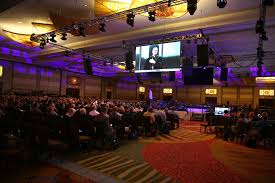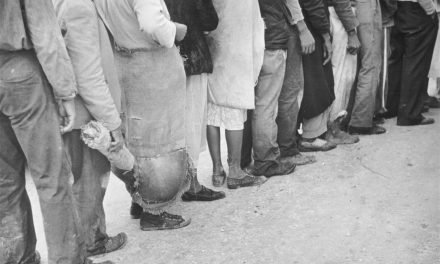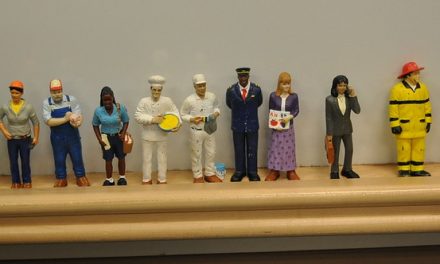This is a guest post by Dr. Michael Jaycox for our Conscience at the Polls series. The first post in the series is here and the second post can be found here. Dr. Jaycox first delivered this talk on March 5, 2020, at Seattle University, and he has given us permission to publish it here.
He offers an argument proposing that, in the U.S. political context, we encounter a very common and problematic interpretation of Catholic tradition on the primacy of the moral conscience: “All Catholics should follow their conscience when voting, some of them will vote Democrat, some of them will vote Republican, and all of this is fine.” Although many would cite Thomas Aquinas in support of this interpretation, such a position actually amounts to a deep abandonment of Catholic ethical commitments in practice.
We hope that his thoughts will generate a fruitful conversation:
Since I’m giving a talk about what Catholic tradition says about the primacy of conscience in the context of the current U.S. political situation, the natural point of departure would seem to be the U.S. Catholic Bishops’ most recent version of the “Forming Consciences for Faithful Citizenship” pamphlet.
In this document, the Bishops retain a distinction carried over from previous versions of the document: That certain issues are matters of “intrinsic evil” about which Catholics can never in good conscience hold a permissive position, while all other issues are matters of “prudential judgment” on which Catholics can reasonably disagree.
However, the Catholic ethical tradition actually holds that whenever you are deliberating among possible courses of action, you are always by definition exercising your capacity for prudential judgment, more or less well. The use of this capacity doesn’t simply “drop out of the picture” when a Catholic is thinking about abortion or any of the other issues deemed matters of intrinsic evil.
So the real ethical question here isn’t which issues are the “non-negotiables” involving an absolute moral prohibition and which other issues are matters of personal judgment that can go one way or the other. Rather, the real ethical question is how human beings arrive at these ethical judgments by exercising their moral conscience as they participate in the public sphere, that aspect of our shared human life where we consider how to promote and protect the common good.
In addition to clarifying what the real question is, I should mention another salient point here: that the consciences of Catholics are not formed primarily by reading documents anyway, despite the efforts of the bishops. Consciences are formed primarily by living and being socialized into in a particular type of social context. Folks learn how to exercise their consciences on the basis of the day-to-day experiences, personal relationships, cultural norms, institutional policies, and the relative amount of social power they have. If I had to come up with a rough estimate as an ethicist, about 90% of how a conscience gets formed is attributable to this implicit socialization process that happens in your social context, while only about 10% happens as a result of explicit reflection from reading a document.
So it may be that the “Forming Consciences for Faithful Citizenship” pamphlet isn’t really the best point of departure after all for an ethical discussion about the primacy of the moral conscience. Catholics are not likely to use this document as a guide for voting, but instead, as a Rorschach test: They will find the thing they want to see in the document, and then they will go about voting the way they were already planning to vote anyway.
There is one thing in this document, however, that I did like very much, that does make a good point of departure: In section 17, there is a quotation from the catechism, which is really just a paraphrase of a point made by the medieval theologian Thomas Aquinas. The quotation reads:
“Conscience is a judgment of reason whereby the human person recognizes the moral quality of a concrete act that they are going to perform, are in the process of performing, or have already completed. In all they say and do, the human person is obliged to follow faithfully what they know to be just and right.”
FCFC, #17.
The two most important parts of this statement are: (1) that judgments of conscience are based in human reason, and (2) that you should always follow your conscience.
This second point is especially pertinent to our discussion. The bishops are correct to insist that the individual’s moral conscience should be properly informed by the wisdom of one’s community and traditions, to prevent the possibility of an erroneous or malformed conscience.
But the actual tradition in Catholic thought that we get from Thomas Aquinas is much more radical on this point. He did not deny that individuals should in general defer to the judgment of their religious community and its authorities. (He was, after all, a medieval thinker.) But he still insisted that even when the judgments of the moral conscience are based on objectively bad reasoning or false information, the individual should still follow this judgment of conscience anyway, no matter what. To do otherwise, to act against one’s own conscience, would be to second-guess your own human capacity for freedom of choice. It would be to deny, in a sense, your own human dignity as a creature made in the image of a God who is perfectly free and active. Aquinas even says that if you were to choose an action that you believe to be wrong, then you will have used your freedom in a way that is evil, regardless of whether your belief is actually true or not.
Conscience, according to this tradition of Catholic thought, is basically a link between human rationality and human freedom. Humans have to be responsible for their free choice of actions, and this ethic of responsibility must be maintained even in cases of ignorance and faulty thinking.
This tradition of respect for human freedom was rediscovered in the 20th century as Catholicism finally reconciled itself with modern institutions and culture. It was the basis of John Courtney Murray’s argument that Catholics posed no threat to a system of democratic political participation and might even be better suited to this role than their Protestant counterparts. It was the basis of the teachings of the Second Vatican Council on the dignity of the human person and the freedom of each person to choose their religion or no religion at all. And Catholics who dissented from the reiteration of the official prohibition on contraception in 1968 drew upon this teaching about conscience in order to justify their dissent.
That being said, I would like to problematize this tradition a little bit, to muddy the waters. I do not wish to deny the importance of human freedom here, but rather to call attention to adverse social conditions that affect the exercise of the moral conscience.
After the Second Vatican Council concluded in 1965, Catholics worldwide were encouraged to reflect upon “the signs of the times” in order to form their own consciences and consider appropriate courses of action to urgent social issues. Taking this invitation to heart, the assembled bishops of Latin America convened in Medellin, Colombia in 1968 and in Puebla, Mexico in 1979, where they identified a persistent reality affecting human life in a particular way in this region of the globe: “social sin.” The social problems they were talking about were not really new problems: the concentration of power, land, and wealth in the hands of the few, as well as international relationships of neo-colonialism. These were political and economic problems at least 500 years in the making. What was new was naming these social injustices as social sin, drawing upon a tradition of theological reflection in Christianity that took seriously the intractability of unjust and unaccountable suffering and cruelty, as well as the incentives on the part of the powerful to rationalize this unjust system as acceptable or “God’s will.”
Social sin, therefore, is this objectified pattern of structural evil created by human choices, which then bends back in an attempt to limit and control human agency, to draw humans into participating in the unjust system, often if not usually against their will. This concept of deeply-embedded social sin, as compared with parochial, more surface-level ideas about personal sinfulness and repentance, posed not only an ethical challenge but also a profound theological challenge to the people of Latin America: How do we organize and resist to liberate each other from this social sin, drawing our inspiration from reflecting on the gospel and the movements of the Holy Spirit?
I propose that in addition to this question, we need to think seriously about how social sin can corrupt and malform the moral conscience. Since social sin inevitably involves some kind of ideological rationalization of evil, is it still safe to assume that the conscience is an ethically sound guide for action?
These kinds of questions are incredibly important to raise here, particularly since most of us live on this side of the border separating North America and Latin America, having this academic discussion many miles away from that borderland where we know the fruit of social sin is on full display: concentration camps for migrants, asylum-seekers, and refugees, including unaccompanied children. Since this is the social reality, can we rely on the consciences of Catholics, which Catholic tradition says they should follow no matter what, to guide them toward actions that will undermine and disrupt this pattern of structural evil?
Let us recall the statistical fact that 52% of Catholic voters cast a ballot for the Republican nominee in the 2016 election.
I’d also like to call our attention to some research that my colleague Bryan Massingale published in 2015. He proposes that nonconscious racial bias exerts a significant influence on the formation of Catholic consciences, and the consciences of white Catholics in particular. He also argues that the influence of this nonconscious socialization process is almost completely unaccounted for in the standard conceptual frameworks used for theorizing about conscience in our field. Therefore, while the U.S. Catholic bishops did take the step of adding “acts of racism” to their list of “intrinsic evils,” Massingale’s point underscores the inadequacy of this way of understanding what racism is, not to mention the bishops’ generally exhortative approach of offering authoritative moral guidance.
Yet Massingale also raises another, even more troubling issue: When racism is understood primarily as discrete acts of bigotry, rather than an extensive system of white socialization that is symbolically reinforced and confirmed as “normal,” white people can easily absolve themselves of this social sin by reassuring themselves that they aren’t bigoted. They’re just voting for X candidate because they don’t like “taxes” or because of abortion, for example. Their individual conscience is “clean,” so to speak, despite the fact that they are conveniently ignoring and enabling what is perhaps the greatest threat to the common good in our political context: systemic racism.
It would be a very naïve and shallow moral analysis that tries to explain this kind of narrow moral vision by attributing it to ignorance or bad reasoning. It goes so much deeper. Those who operate in this way have, in a sense, followed their conscience, but their conscience has so decidedly abandoned the common good of society as a moral goal that the phrase “always follow your conscience” is evacuated of any substantive meaning.
I think the best way to address these issues is actually by directing attention away from this myopic focus on questions about whether to follow your conscience, whether your conscience has been correctly formed, how we explain situations in which your conscience directs you to choose the wrong thing, and so on. Then we can redirect that attention toward broader ethical questions about responsibility in a very complex society such as ours: How do we think responsibly, how do we choose responsibly, and how do we participate in society responsibly?
This refocusing on responsibility makes sense because it addresses the basic value that the primacy of conscience is trying to protect: the dignity of human freedom. Even if our consciences are “compromised” (in a manner of speaking), we are still responsible for the way we participate in our society. Our individual fulfillment is still bound up in the pursuit of the common good.
My colleague Elizabeth Sweeny Block underlines this exact point in some of her recent research. For too long, Catholics have thought about their consciences in individualistic ways, ironically enough on the model of Martin Luther: the individual person who takes a stand on principle and rejects the policies of the corrupt institution because their conscience compels them to dissent. Block calls this model “the reflexive conscience.”
While this way of operating is definitely one of the legitimate possibilities for using human freedom, it leaves out so much. Conscience isn’t just about what we must reject or refrain from doing; it is also about what we must affirm and pursue. Likewise, conscience isn’t just about what the individual must do to be true to themselves; it is also about what our mutual responsibilities are in relation with our neighbors. The systemic and structural character of moral problems in our highly complex, pluralistic, interconnected, postmodern societies should force us to consider that the purely “reflexive conscience” is inadequate and incompetent for meeting such challenges. As an alternative, Block suggests the model of an “engaged conscience,” which begins with the assumption of social responsibility leading to action, instead of a politics of individual purity. This model of conscience is particularly essential for well-intentioned yet privileged people to consider, due to the fact that they often experience a sort of moral inertia, being overwhelmed by the sheer scale of national and global ethical problems and tempted by the illusion of powerlessness.
And so, I’ll conclude by offering this challenge to everyone here, and I also direct it in a particular way to the white liberals sitting in the room: If you want to exercise your conscience by voting, please do that. But that voting is a necessary condition for pursuing the common good, not a sufficient condition. If we keep the social sin of systemic racism in full view, its threat to the common good, and the likelihood that your socialization and also your conscience have been affected by it, then you must also organize. Your responsibility for your neighbors and for pursuing the common good compels you to engage the white people who vote differently from you, the ones you avoid talking to, the people you have access to in a way that persons of color in this room do not. You are not likely to succeed, recalling the 90%/10% figure I mentioned earlier, but if any softening of the heart is possible, it might be because you intervened.
One of the most important insights that Christianity offers to all human cultures is the idea that we do not get an infinite number of opportunities to do the right thing. We get a finite number. Our own character, and the character of our world, is determined by what we choose to do with those opportunities.





Trackbacks/Pingbacks